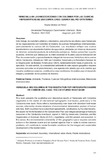Venezuela en las negociaciones con Colombia por las cuencas hidrográficas de uso común. Caso: cuenca del río Catatumbo
Date
2008-11-12Author
Palabras Clave
Ambiente, Fronteras, Cuencas hidrográficas internacionales, Relaciones internacionalesEnvironment, Boundary, International water sheds, Relate international
Metadata
Show full item recordAbstract
Este trabajo de caráctercualitativo y descriptivo, presenta los resultados para Venezuela de las negociaciones con Colombia
en materia de cuencas hidrográficas internacionales, particularmente la cuenca del río Catatumbo. Los resultados reflejan
una cuenca transfronteriza con abundantes fuentes de agua dulce, afectadas por diversas situaciones de deterioro ambiental producto de actividades antrópicas. Ambos países han suscrito acuerdos, entre los que destaca por su intencionalidad el Acuerdo para la formulación del Plan de conservación y aprovechamiento integral de los recursos hidráulicos de la cuenca del río Catatumbo, firmado en 1982 por Colombia, Venezuela y la Secretaría General de la Organización de Estados Americanos (OEA), lamentablemente hasta el presente, no ejecutado. En este sentido, la vulnerabilidad ambiental de este espacio geográfico requiere acciones concretas en el plano bilateral y una agenda más abierta que en la medida que resuelva
problemas comunes, contribuirá a crear condiciones favorables para el desarrollo integral y sostenible de los pueblos de
frontera.
Collections
Información Adicional
| Otros Títulos | Venezuela and Colombia in the negotiation for hidrographics basins on common use. case: the Catatumbo river basin |
| Correo Electrónico | maymedina@cantv.net |
| Resumen en otro Idioma | This work presents the qualitative and descriptive results of Venezuela with Colombia negotiation in the matter of international hydrographic river basins, particularly in the Catatumbo river basin. Facts reflect a transboundary river basin with abundant fresh water sources, affected by diverse situations of environmental deterioration product of human activities. Both countries have subscribed agreements, emphasizes by his intentionality, the accord for the formulation of the Conservation Plan and integral advantage of hydraulic resources in the Catatumbo river basin, signed in 1982 by Venezuela, Colombia, and the Organization of American States (O.A.S.), regrettably, until the present, not executed. In this sense, the environmental vulnerability of this geographic space requires concrete actions in the bilateral scene and an opened agenda than in order to solves common problems, will contribute to create favorable conditions for the integral and sustainable development of the border towns. |
| Colación | 205-220 |
| País | Venezuela |
| Publicación Electrónica | Revista Geoenseñanza |
| Sección | Revista Geoenseñanza: Artículos |






